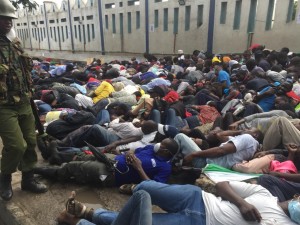
31 March, 2020
Kenya: Police must stop the use of excessive force while enforcing the curfew law
This post was first published by Defenders Coalition
The civil society’s Police Reforms Working Group, comprised of twenty national human rights organisations, condemn the unnecessary and excessive use of force by Kenya Police Service officers yesterday at the Likoni Ferry Crossing, Mombasa. The police actions completely betrayed the specific responsibility bestowed upon them by the President; to facilitate orderly passage of commuters on the Likoni crossing.
Alongside elected leaders and members of the public, we were horrified by the excessive use of police force contrary to the functions of the Police laid out in Article 244 of our constitution. Police indiscriminately threw teargas, frog marched and beat up members of the public trying to get home in time for the curfew.
We also condemn the assault of Nation Media Group Journalist Peter Wainaina by a uniformed police officer during the operation. We remind the Police that journalists and media houses are among the essential services exempted from the curfew order as per the Schedule published by the Ministry of Interior.
It is unbelievable that this violence took place two hours before the designated curfew time of 7.00pm. It is essential that Kenyan law and international human standards are respected. Police bear a duty to maintain public order and enforce the law. They may only use force when strictly necessary. Where the use of force is unavoidable, it must also be done with restraint.
We continue to receive testimonies from victims, eyewitnesses and video footage showing police gleefully assaulting members of the public in other parts of the country. We note that in most instances, few posed no immediate threat to the police officers or others. The use of force and beatings was unnecessary and unlawful.
One day before the Likoni Ferry fiasco, the National Police Service Inspector General issued clear instructions to his officers. These instructions clearly state his commitment to hold sub-commanders accountable for any police actions that lead to congestion, crowding or violate social distancing rules. We ask him to honor his own word by disciplining the Sub-Commander in charge of yesterday’s fiasco. We also call upon Officers Commanding Station (OCSs) to be guided by the Bail and Bond Policy Guidelines as they deal with petty offenders at the station level.
We further call upon the National Police Service Inspector General to restrain his officers from using teargas to avoid potential spread of COVID-19. Hundreds were forced to cough, vomit, spit and touch their faces to wipe away tears and unblock their mouths and noses. If the operation was supposed to protect people from spreading the virus, the operation achieved the exact opposite. It is imperative that Ministry of Health guidelines on prevention of the spread of COVID-19 are followed by Police at all times.
Police officers appear confused on who is included in the categories of critical and essential services on the first night of the curfew. We have testimonies from suppliers and trained medical practitioners who experienced intimidation and threats of arrest as they tried to provide services during the curfew. Their free movement must be protected.
Lastly, we call upon the Internal Affairs Unit of the National Police Service, the Independent Policing Oversight Authority and the Kenya National Commission for Human Rights to investigate all reports of excessive use of force and unlawful policing with a view to holding perpetrators individually responsible. We encourage members of the public to immediately report any intimidation, extortion or violence to these agencies. Public order management must not be used to inflict pain, fuel panic and fear at this at this difficult time.
We shall intensify our monitoring of the curfew in the public interest.
This statement is signed by the Law Society of Kenya – Mombasa and members of the Police Reforms Working Group, an alliance of several organisations committed to professional and rule of law policing. They include the Social Justice Centres Working Group, International Justice Mission, Independent Medical Legal Unit, Kenya Human Rights Commission, Defenders Coalition, Haki Africa, Amnesty International Kenya, International Centre for Transitional Justice, The Kenyan Section of International Commission of Jurists (ICJ Kenya), Usalama Reforms Forum, Federation of International Women Lawyers (FIDA-K) Legal Resources Foundation, Transparency International Kenya, Shield For Justice, Wangu Kanja Foundation, Peace Brigades International and Katiba Institute
Photo Credit: Daily Nation



